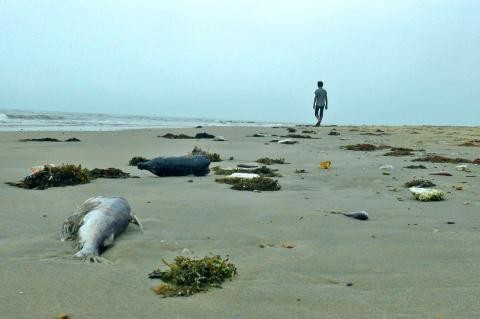Vietnam yesterday said a US$10.6 billion steel plant run by a unit of Formosa Plastics Corp (FPC, 台塑) caused an until-now mysterious environmental crisis by releasing toxic wastewater into the sea.
Formosa Ha Tinh Steel Corp (台塑河靜鋼鐵興業), which has built a new plant set to become the biggest of its kind in Southeast Asia, on Tuesday admitted responsibility for a disaster that caused massive fish deaths in coastal provinces in April, head of the government office Mai Tien Dung said.
The spill sparked public outrage across Vietnam and three successive weekends of protests, with demonstrators venting their fury at both Formosa and the government, accusing them of a cover-up.

Photo: AFP
Formosa had apologized and would provide US$500 million in compensation for those affected by the disaster, Dung said.
“Violations in the construction and testing operations of the plant are the causes for serious environmental pollution, killing a massive amount of fish,” Dung told a packed news conference. “Formosa has admitted responsibility for the fish deaths in four central provinces and committed to publicly apologize for causing severe environmental incidents.”
Formosa yesterday said the company respects the Vietnamese government’s probe and blamed the misconduct on oversight by its construction contractors in Vietnam.
The company expressed regret over the incident in a statement, saying it would work with the Vietnamese authorities to compensate the damage done to Vietnamese and solve the pollution issue.
The Ministry of Economis Affairs’ Department of Investment Services said it respects the agreement reached between Formosa Ha Tinh Steel and the Vietnamese government.
“We have contacted the Vietnamese Ministry of Foreign Affairs right after the release of the government’s investigative report this afternoon,” department Director-General Vivien Lien (連玉蘋) said by telephone, expressing the hope that the event would not affect the relations between Taiwan and Vietnam.
Lien said the Vietnamese Ministry of Public Security has promised the Taiwanese representatives in Vietnam that it will ensure the safety of Taiwanese in the nation following the incident.
Formosa’s steel plant is among the largest investments by a foreign company in Vietnam.
In April, the media reported that chemicals from a drainage pipe had killed fish, but a preliminary investigation by Formosa and a separate investigation by the Vietnamese government found there was no direct link between the steel plant and the deaths.
The initial government probe concluded the cause was either toxic discharge caused by humans or “red tide,” when algae bloom and produce toxins.
The incident sparked a crisis for the administration of Vietnamese Prime Minister Nguyen Xuan Phuc, who took office days after dead fish started washing up along a 200km coastline on April 6.
Additional reporting by Ted Chen and Lauly Li

MISINFORMATION: The generated content tends to adopt China’s official stance, such as ‘Taiwan is currently governed by the Chinese central government,’ the NSB said Five China-developed artificial intelligence (AI) language models exhibit cybersecurity risks and content biases, an inspection conducted by the National Security Bureau (NSB) showed. The five AI tools are: DeepSeek, Doubao (豆包), Yiyan (文心一言), Tongyi (通義千問) and Yuanbao (騰訊元寶), the bureau said, advising people to remain vigilant to protect personal data privacy and corporate business secrets. The NSB said it, in accordance with the National Intelligence Services Act (國家情報工作法), has reviewed international cybersecurity reports and intelligence, and coordinated with the Ministry of Justice Investigation Bureau and the National Police Agency’s Criminal Investigation Bureau to conduct an inspection of China-made AI language

BOOST IN CONFIDENCE: The sale sends a clear message of support for Taiwan and dispels rumors that US President Donald Trump ‘sold out’ the nation, an expert said The US government on Thursday announced a possible sale to Taiwan of fighter jet parts, which was estimated to cost about US$330 million, in a move that an expert said “sends a clear message of support for Taiwan” amid fears that Washington might be wavering in its attitude toward Taipei. It was the first announcement of an arms sale to Taiwan since US President Donald Trump returned to the White House earlier this year. The proposed package includes non-standard components, spare and repair parts, consumables and accessories, as well repair and return support for the F-16, C-130 and Indigenous Defense Fighter aircraft,

CHECKING BOUNDARIES: China wants to disrupt solidarity among democracies and test their red lines, but it is instead pushing nations to become more united, an expert said The US Department of State on Friday expressed deep concern over a Chinese public security agency’s investigation into Legislator Puma Shen (沈伯洋) for “secession.” “China’s actions threaten free speech and erode norms that have underpinned the cross-strait ‘status quo’ for decades,” a US Department of State spokesperson said. The Chongqing Municipal Public Security Bureau late last month listed Shen as “wanted” and launched an investigation into alleged “secession-related” criminal activities, including his founding of the Kuma Academy, a civil defense organization that prepares people for an invasion by China. The spokesperson said that the US was “deeply concerned” about the bureau investigating Shen

‘TROUBLEMAKER’: Most countries believe that it is China — rather than Taiwan — that is undermining regional peace and stability with its coercive tactics, the president said China should restrain itself and refrain from being a troublemaker that sabotages peace and stability in the Indo-Pacific region, President William Lai (賴清德) said yesterday. Lai made the remarks after China Coast Guard vessels sailed into disputed waters off the Senkaku Islands — known as the Diaoyutai Islands (釣魚台) in Taiwan — following a remark Japanese Prime Minister Sanae Takaichi made regarding Taiwan. Takaichi during a parliamentary session on Nov. 7 said that a “Taiwan contingency” involving a Chinese naval blockade could qualify as a “survival-threatening situation” for Japan, and trigger Tokyo’s deployment of its military for defense. Asked about the escalating tensions